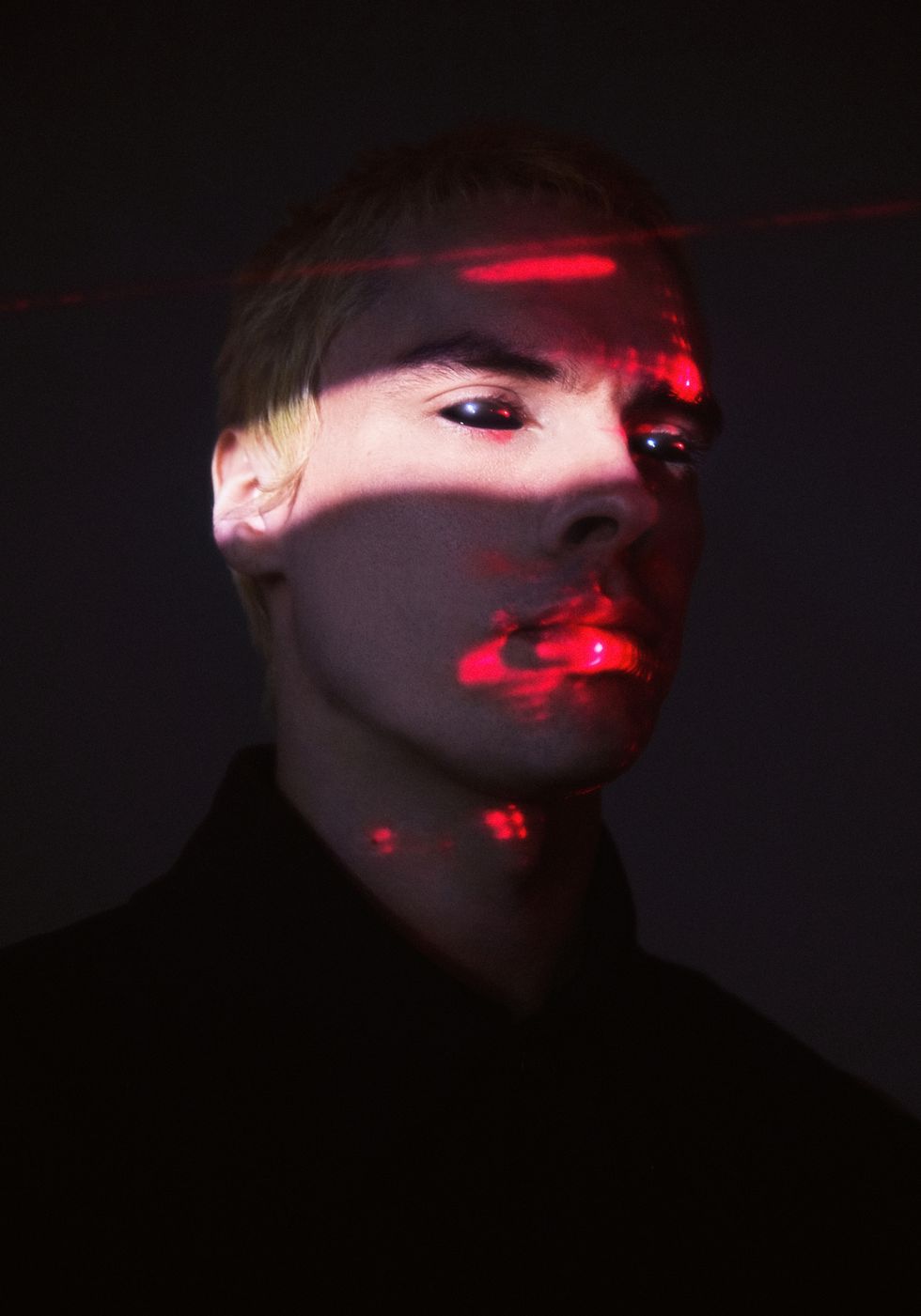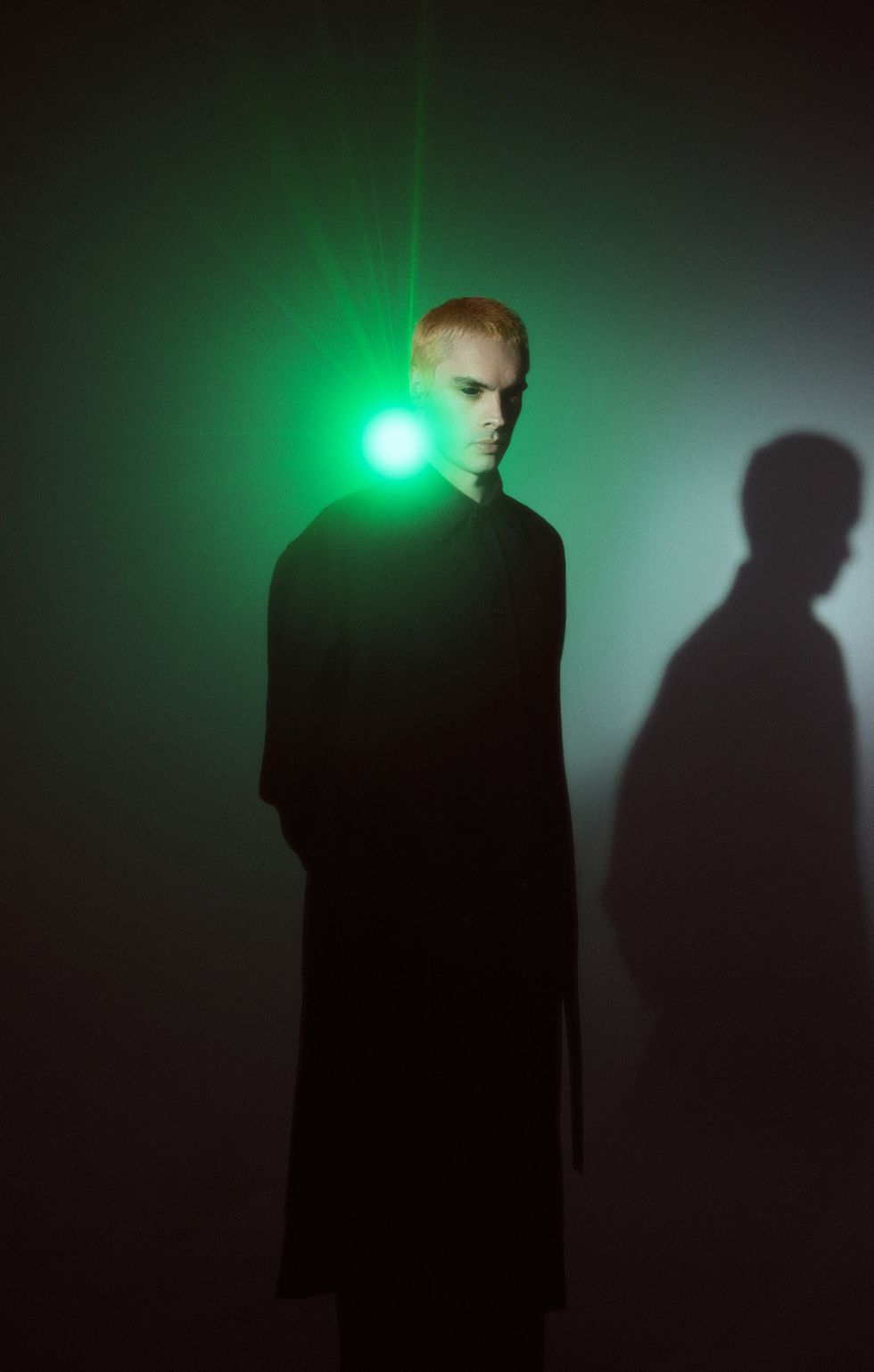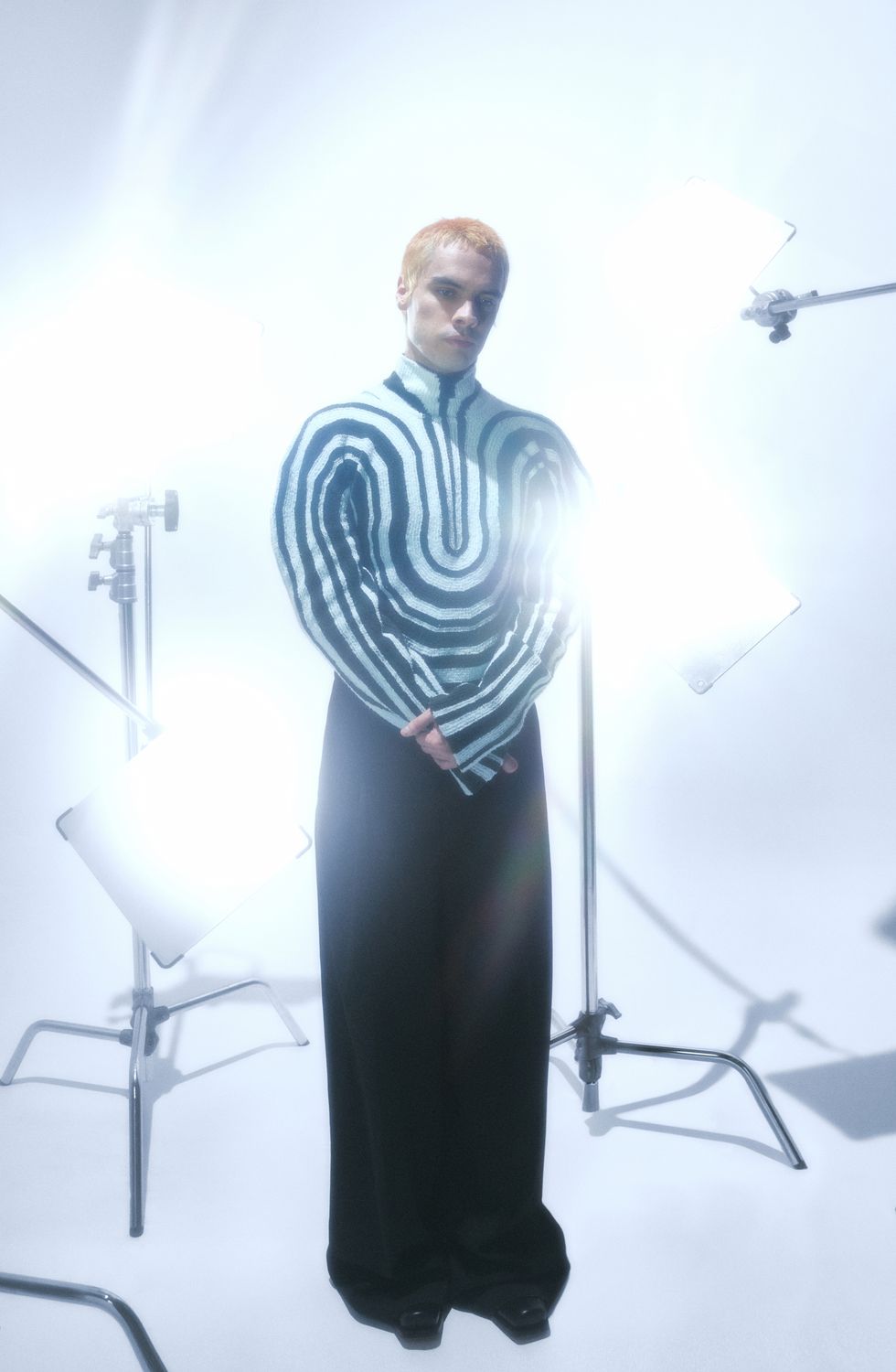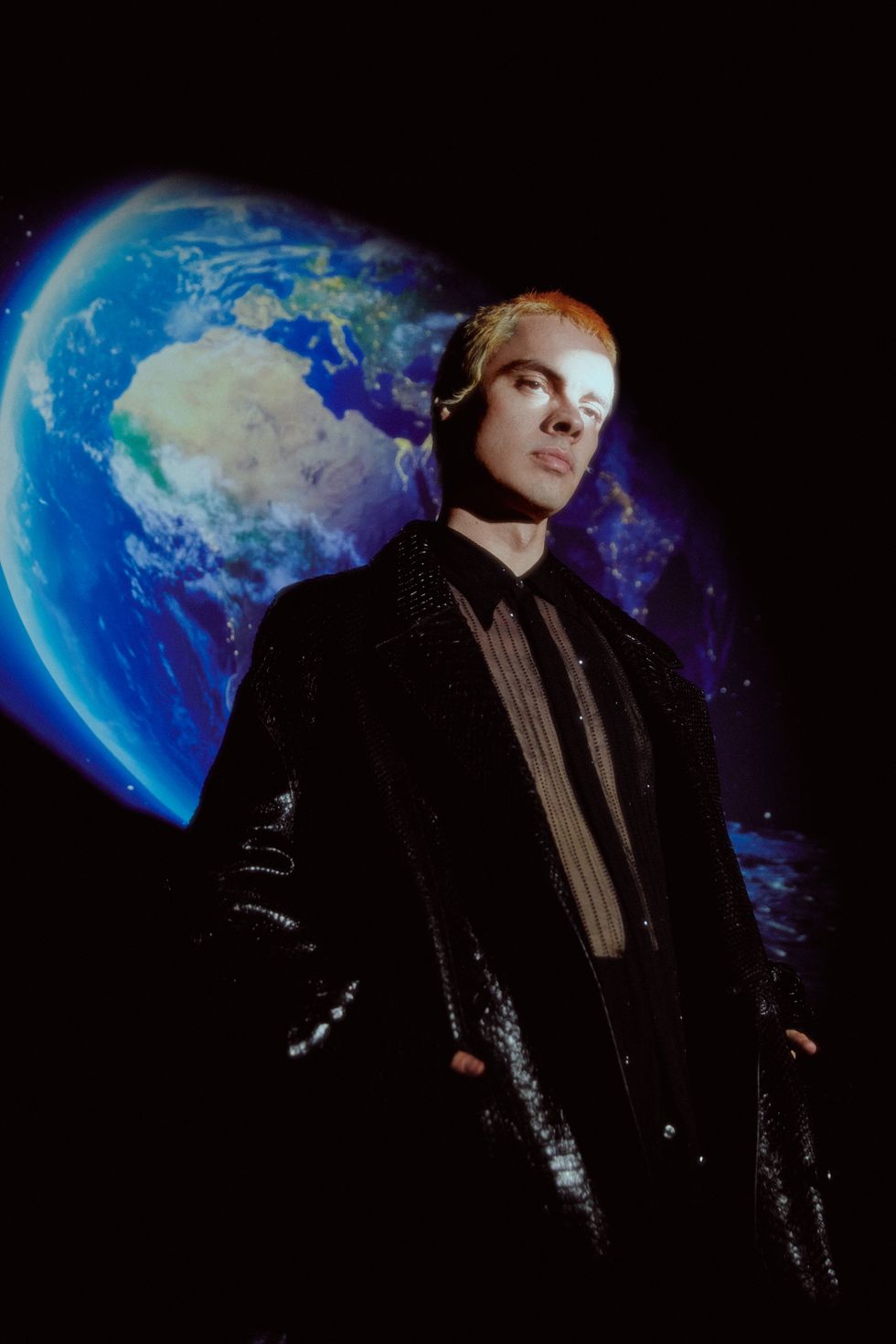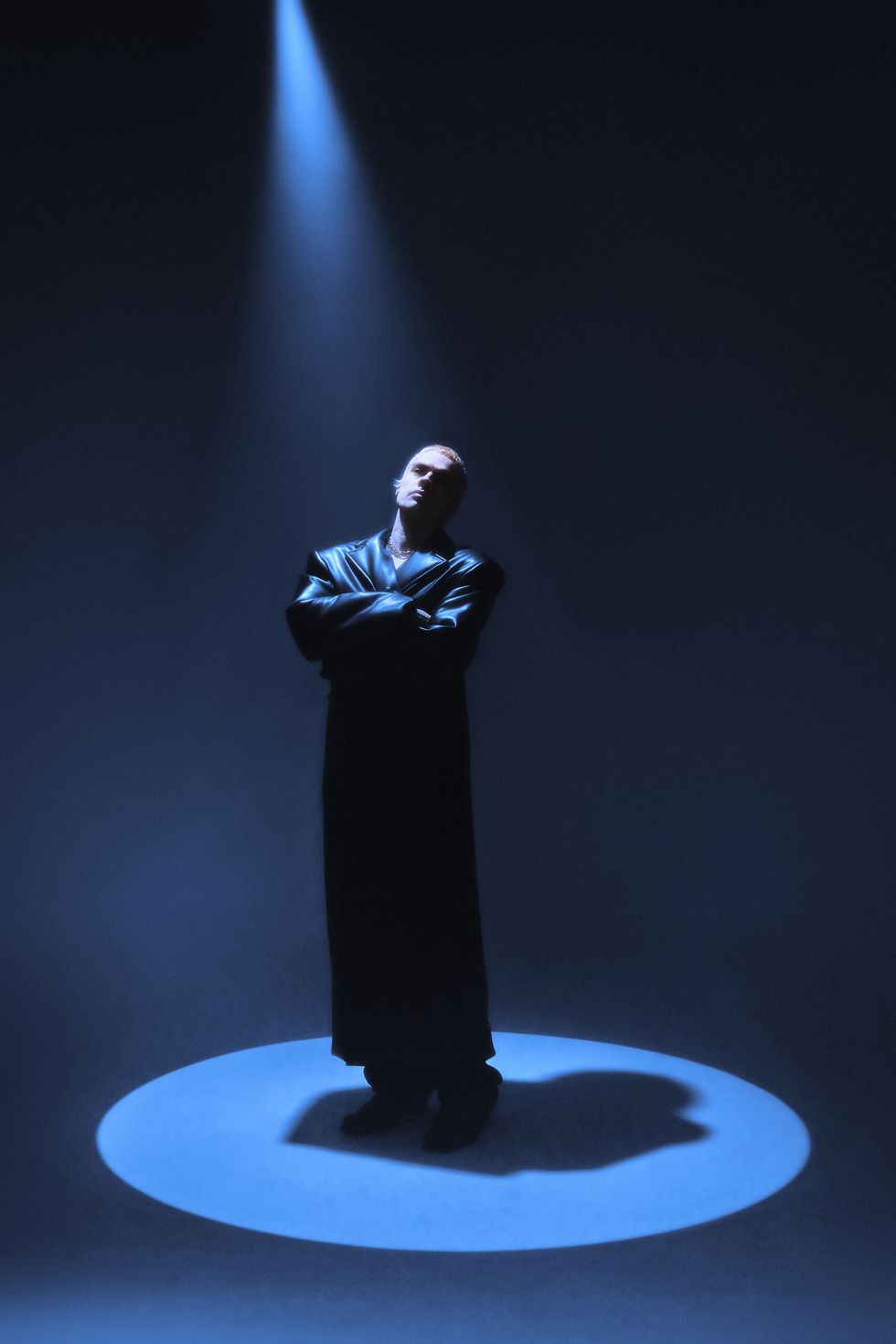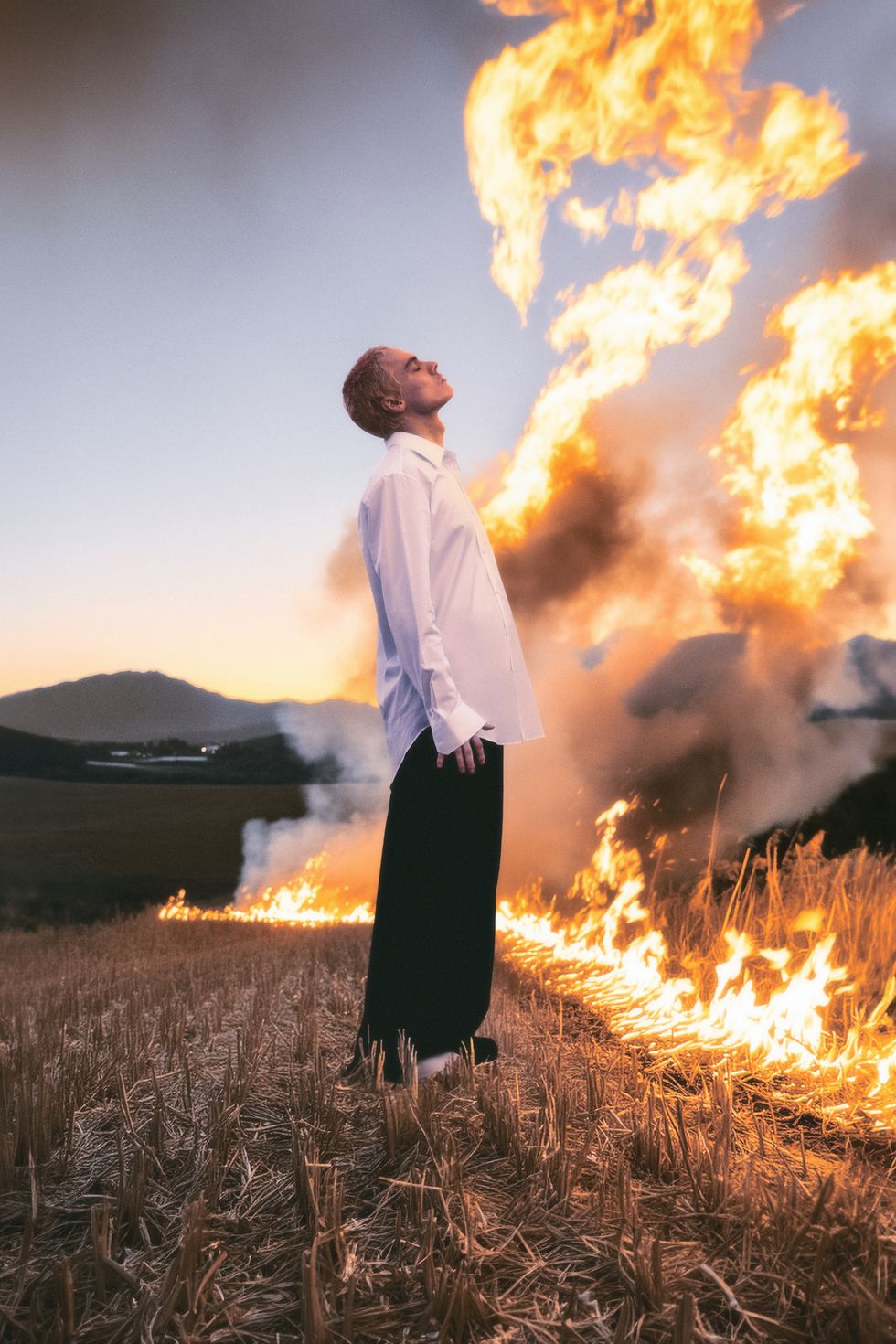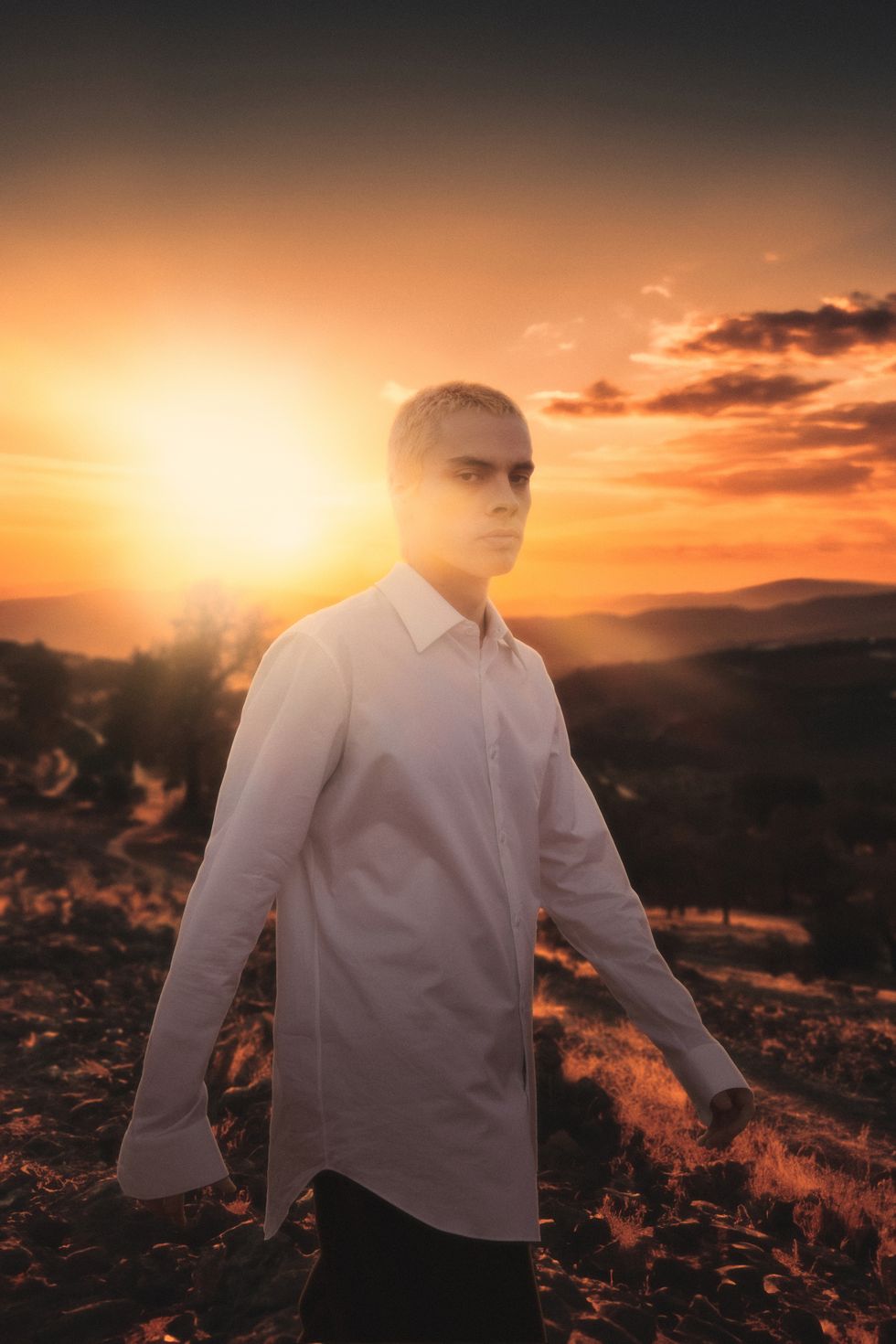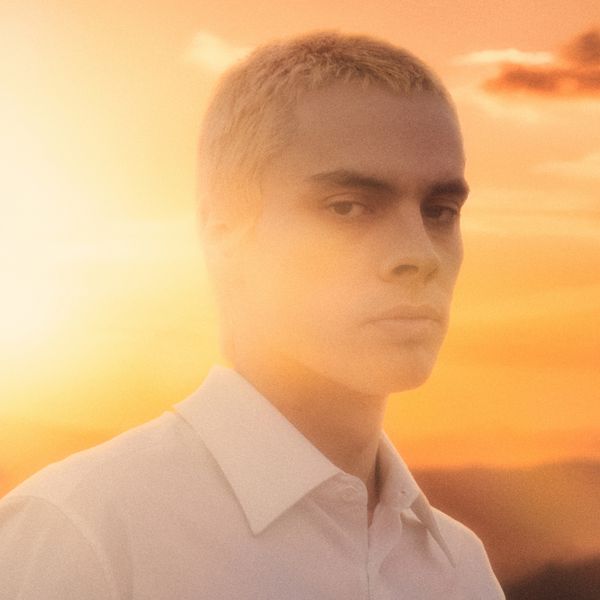
Sega Bodega Is Still Dreaming
By Tobias Hess
Jul 03, 2024Salvador Navarrete has a lot to do. The Irish-Chilean super-producer and artist, known to the world as Sega Bodega, is pacing around a spacious Paris apartment, wrangling clothes and packing when I call him over Zoom a few days after his latest album’s release: the propulsive, cerebral Dennis. This multitasking fervor is a fitting mode. His many projects have cycled through the zeitgeist in a near-constant churn for the past half-decade. Whether it was his three solo albums, or his production on seminal albums and records like Shygirl’s Nymph, Caroline Polacheck’s “Sunset” or Eartheater’s Powders, Navarrete’s style — caustic, visceral, a bubbling cauldron of alien vocals and metal roars — has helped define the sound of the 2020s.
Dennis continues his artistic development which has steadily moved skyward. Bodega's first album, the darkly intimate 2020 Salvador, was a brooding haunt through a dimly lit bedroom. On it, his deep voice beckoned the listener towards the heathenish. His follow-up, Romeo, seemed to fly out of the bedroom and perch itself on the top of a nearby building. The floaty, angelic project circled the sacred and profane as songs like “Only Seeing God When I Come” and “Angel On My Shoulder” merged the physical body with the transcendent.
Dennis, though, seems to forgo the world as we know it for the one we experience in our dreams. A floaty, at times euphoric, at times nightmarish journey through the subconscious, Dennis is an exploration of surprising association, the kind of expansive logic that only makes sense in your dreams. Its cover features a spotlit Navarrete lying beneath a ghoulish swan in a dark, old theater. It’s a likely setting for a dreamscape given that he tells me he’s been having a real bout of “stress dreams” lately. He is, after all, hopping around the world from club to club, studio to studio, and yes, from theater to theater.
There is much to do and much to make and little time to do it all before sleep lulls your tired mind. Thankfully for us, Navarrete was able to carve out some time in his hectic schedule to talk with PAPER about his new album, collective consciousness and the mysteries of inspiration.
Hey!
Hey! Where are you?
I'm in Brooklyn. What about you?
Cool. I’m in Paris.
How’s Paris?
I love Paris. I'm convincing all my friends to move here. It's kind of working.
What do you like about Paris?
It's slower. I need slower.
Yeah, I feel that. Congrats on the record. I've been following your work for a while and Dennis feels like a progression, so I'm excited to chat with you about it. What have you been up to since the record came out?
I'm going on tour tomorrow with another band I have called Kiss Facility. We’re touring with Erika De Casier. We've just been practicing and rehearsing. It's [my bandmate] Mayah [Alkhateri’s] first time ever performing, so we’re just mentally preparing each other for that, but it's gonna be great. I had a party for the album on Tuesday, and that was really nice and friends came out like Eartheater, okaylou and Mayah. We all just sang some of our own songs.
Do you feel like you've been able to take in the response to the album, or have you been in “go mode” because of the tour?
Both. I've definitely been taking it in, but at the same time I have to not look at the [reaction online], because it doesn't matter. I need to remember that. I just focus on the other shit I have to do, because I can sit spiraling on the internet for hours on end.
The new album explores dreams and sleep. Especially given all that you do, what's your relationship to sleep these days?
Now it's bad. I wake up every hour at this point and I'm always checking the time because I have so much stuff to do. I usually get to sleep in late, though, which is nice.
Do you dream?
Yeah, I have been dreaming. They haven't been the nicest dreams. Definitely been having some stress streams.
Do you write down your dreams?
No. I was going to while I was making the album, but I ended up just not doing that. A friend of mine, Rick Farin and his wife, Claire, made the music video for “Set Me Free I'm An Animal.” They’re my best friends, and we work together on lots of different things. Rick is quite a sleep talker and throughout the process of the record, Claire would document the things he was saying in his sleep and we used those words across the album at the end of some songs. I had [artist, filmmaker, and writer] Miranda July say those things that he would say in his sleep. So, all of those words are the weird things that he said in his sleep. They were such perfect pieces of sleep-talking nonsense. They don't make any sense, but they're very beautiful.
How did you connect with Miranda July?
I had been struggling to find the person to say Rick’s words because the voice needed to be so correct. I couldn't think of any one of my friends to ask and had no leads whatsoever. I love Miranda July’s movies. Mayah and I had just watched Fire of Love a year ago and she was like, “You should ask Miranda July.” I was like, “I can't. That's not gonna happen.” But so many of my collaborations, especially the ones that are very far away from my world, have come about just because I asked. I sent her a message on Instagram. I told her how much of a fan I am of her. I explained the concept and that it wouldn't be a lot of work for her. And then we had a 10-minute call over Facetime, and she just kind of killed it. I’m really happy with that. That completed the album. Up until that point, the album was just like a series of songs. She’s on three songs and those transitions were very hard to do, because the songs are so different. But those bits of dialogue were perfect.
Collaboration is so central to what you do. You're a connecting point for so many artists. What is it like doing your own record? Does the process feel very different than when you're working on a record with Eartheater or Shygirl?
When I work with them, I get to absorb their whole thing and am part of their world. They have such a strong narrative and concept, and I just get to sit and watch them do that. Even though I consider them all very close friends, I'm still a huge fan of these people. And we still share our work. I will talk to them about their project, and they'll talk to me about mine. It's a healthy back and forth.
What’s it like when you don't have them explicitly in the process?
It’s harder. I'll always get someone else's opinion while I make my records. I have to.
You were doing sessions on Twitch. Is that almost a way to source the opinion of the collective? [You can see Navarrete craft songs on Twitch from such as “Adulter8” here]
That was using a test I did to see how I liked it. I really enjoyed it, but then at the same time, I also found myself catering to the chat room a bit more than I was expecting to. You do something, and then the chat room goes crazy, and you do something and the chat room is not saying a thing, and you're like, Well, fuck, this must suck. They're not gonna be like, “This is bad.” But you can just see the reaction.
I feel like that plays into the idea you've talked about surrounding the idea of collective consciousness. You named the album Dennis partially after the 1950s American cartoon character, Dennis the Menace who had an uncanny similarity to another Dennis cartoon in the UK, created at the same time with no connection to its American parallel.
Yeah, I named it after that partially. I was watching True Blood. They were talking about the Greek God, Dionysus. He's referred to as the “God that Comes.” I was like, “Oh, that's funny. I have a song called ‘Only Seeing God When I Come."' And [Dionysus] is where the name Dennis comes from. And then at the same time, I was reading the story about Dennis the Menace. Plus, I was playing around with different words and anagrams. At one point I threw in the word, Sinned, and Dennis came up again [Sinned spelled backwards is Dennis]. I was like, You know what? I think the album's called Dennis. There were enough things at the same time. I don't know anyone called Dennis, but the name kept popping up and I was like, Okay, let’s listen to that.
Are you someone who looks for repetitions or signs for inspiration?
I don't ignore them. I don't look for them, but I don't ignore them.
So many people think about their art as “my thing,” and you seem to have a more expansive, communal relationship, given this notion of the collective consciousness.
Yeah, but anyone who thinks like that: I'm sorry, you're an idiot. You didn't invent anything. People that inspired you didn't invent anything. Everything was inspired by something else. That's just a fact. I see a lot of people say. “Oh I know I'm on their mood board, but they're not paying me.” I'm like, What? First of all, that's a crazy concept to be paid for inspiring someone. At the same time, I know for a fact that these people want to be influential. They want to be inspiring other people, but then when they see that they're directly inspiring someone else, they’re like, “Pay me.” That's crazy. People are doing very normal ideas and then someone else will pop up a couple of weeks later [with a similar idea] and they're like, “You're copying me.”
I would say, though, that this would actually apply to someone like SOPHIE. Her sound was so specific. You could hear when someone was copying it. But there's not that many people who have such a unique standalone sound that can qualify as being fully original at the moment. People have certain things that they do, but that's not also theirs.
Have you always had that kind of relationship to your art and art making that was so shared and collaborative?
I think you'd lose your mind if you had a desire to always have ownership. I mean, you can own the physical things. encourage people to own their rights, but at the same time: you can copy me, steal my ideas, sample me. I don't care. That's kind of also why I have an issue with [discourse surrounding] using different culture’s sound in your music, unless you're explicitly pretending, like you are from that place. Music has always been inspired by different cultures.
And nobody actually cares about these things when it's good. No one has ever said to Timbaland, “You don't own that Indian sound,” because he did that so well. I am very inspired by Arabic music. There's definitely some things in my songs that people have said sounds Turkish. I don't honestly listen to much Turkish music, but it happens to sound like that. And no one's ever been mad at that, and I'm glad. But there is a real kind of protectiveness. You can appreciate other people's styles and backgrounds.
I was thinking about the scope of your solo records. I feel like each record is lifting further and further off the ground. Salvador had a really raw intimacy and then Romeo was more transcendent. Now I feel like we're fully up in the clouds sonically on Dennis.
It's not intentional. I'm proud of all the things I've done, but I wish I had waited a bit longer to release the first album Salvador. I was trying a lot of different things. I was trying to be a bit more pop and I didn't enjoy that. The next album came out pretty quickly, like a year after it. I wish I just waited a bit to get comfortable with my voice, but I am really proud of it. I think it says a lot of things that I wanted to say.
I would say that probably one of the progressions is that your voice has become more textural than lyrical.
That’s intentional. I feel like I'm a producer first and then a singer second. I definitely hide behind a lot of effects. And I really enjoy that. It's fun for me to figure all the ways I can fuck with a voice.
What's your relationship with lyrics in that context?
I just mumble gibberish for 20 minutes into a microphone. A word will just pop up here and there. “Tears & Sighs” on the album is a good example of that because I had this word: “seeking.” That was the word that popped up. I really liked how it sounded in the context of the song. I just had to build the sentence backwards to get to that word: “speaking, seeking.” I was just following those things and going with it, and not being scared to sound like an idiot.
I imagine that some of the artists you're working with write songs in a more traditional sense?
Everything is different every time. I get very bored of my own process a lot, too. That's why I try a whole new approach quite often.
What are you thinking about for this tour? How are you approaching playing this record live?
I want it to feel like a big, stupid club.
You're playing the show Under the K Bridge with Björk [in May], right?
Yeah.
You’ve collaborated with Björk a few times now. What have you learned through working with her?
To be patient. To let the idea come when it comes. Talking about this could take years, but yeah: just to be patient.
Creative and photography: Bryan Torres
Styling: Francisco Ugarte
Production: Isabel Martínez-Zurita
Art direction: Andrea De la Vega
Makeup: Rebeca Martín
Lighting: Joan Calsina
Lighting assistant: Oriol Puchol
Digital: Rita Sortino
BTS artist: Berta de la Cruz
Retouching: Guille Sotelo
Production assistant: Valentín Pattyn
Stylist assistant: Mateo Medina
Art assistants: Carla Carreras, Julia Falcó, Andrea Rodríguez
Lighting: Napalm Lights Key Bcn rental
Special thanks to ESPAI 333
From Your Site Articles
Related Articles Around the Web
MORE ON PAPER
Cardi B sorprende con una presentación inesperada y deja a todos “Ready Pa’l Show”
Español
Feb 14, 2026
ATF Story
Madison Beer, Her Way
Photography by Davis Bates / Story by Alaska Riley
Photography by Davis Bates / Story by Alaska Riley
16 January
Entertainment
Cynthia Erivo in Full Bloom
Photography by David LaChapelle / Story by Joan Summers / Styling by Jason Bolden / Makeup by Joanna Simkim / Nails by Shea Osei
Photography by David LaChapelle / Story by Joan Summers / Styling by Jason Bolden / Makeup by Joanna Simkim / Nails by Shea Osei
01 December
Entertainment
Rami Malek Is Certifiably Unserious
Story by Joan Summers / Photography by Adam Powell
Story by Joan Summers / Photography by Adam Powell
14 November
Music
Janelle Monáe, HalloQueen
Story by Ivan Guzman / Photography by Pol Kurucz/ Styling by Alexandra Mandelkorn/ Hair by Nikki Nelms/ Makeup by Sasha Glasser/ Nails by Juan Alvear/ Set design by Krystall Schott
Story by Ivan Guzman / Photography by Pol Kurucz/ Styling by Alexandra Mandelkorn/ Hair by Nikki Nelms/ Makeup by Sasha Glasser/ Nails by Juan Alvear/ Set design by Krystall Schott
27 October
Music
You Don’t Move Cardi B
Story by Erica Campbell / Photography by Jora Frantzis / Styling by Kollin Carter/ Hair by Tokyo Stylez/ Makeup by Erika LaPearl/ Nails by Coca Nguyen/ Set design by Allegra Peyton
Story by Erica Campbell / Photography by Jora Frantzis / Styling by Kollin Carter/ Hair by Tokyo Stylez/ Makeup by Erika LaPearl/ Nails by Coca Nguyen/ Set design by Allegra Peyton
14 October

